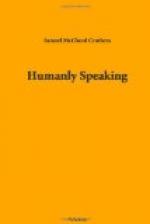Emerson, like the “sociable, accessible, republican sort of man” that he was, was the foe of special privilege. The best things were, in his judgment, the property of all. He would take religion from the custody of the priests, and culture from the hands of schoolmasters, and restore them to their proper place, among the inalienable rights of man. They were simply forms of the pursuit of happiness of which the Declaration of Independence speaks. It is a right of which no potentates can justly deprive the citizen.
Above all, he would protest against everything which tends to deprive anyone of the happiness of the forward look. There was a cheerful confidence that the great forces are on our side. Now and then the clouds gather and obscure the vision, but:
“There are open hours
When God’s will sallies free
And the dull idiot may see
The flowing fortunes of a thousand
years.”
This is the American doctrine of “Manifest Destiny” spiritually discerned.
V
But one need not go so far back as Emerson to see the higher reaches of the American temperament. Perhaps in no one have they been revealed with more distinctness than in William James. There are those who consider it dispraise of a philosopher to suggest that his work has local color. However that may be, William James thought as an American as certainly as Plato thought as a Greek. His way of philosophizing was one that belonged to the land of his birth.
He was as distinctly American as was Daniel Boone. Daniel Boone was no renegade taking to the woods that he might relapse into savagery. He was a civilized man who preferred to be the maker of civilization rather than to be its victim. He preferred to blaze his own way through the forest. When he saw the smoke of a neighbor’s chimney it was time for him to move on. So William James was led by instinct from the crowded highways to the dim border-lands of human experience. He preferred to dwell in the debatable lands. With a quizzical smile he listened to the dignitaries of philosophy. He found their completed systems too stuffy. He loved the wildernesses of thought where shy wild things hide—half hopes, half realities. They are not quite true now,—but they may be by and by.
As other men are interested in the actual, so he was interested in the possible. The possibilities are not so highly finished as the facts that have been proved, but there are a great many more of them, and they are much more important. There are more things in the unexplored forest than in the clearing at its edge. Truth to him was not a field with metes and bounds. It was a continent awaiting settlement. First the bold pathfinders must adventure into it. Its vast spaces were infinitely inviting, its undeveloped resources were alluring. And not only did the path-finder interest him but the path-loser as well. But for his heedless audacity the work of exploration would languish. Was ever a philosopher so humorously tender to the intellectual vagabonds, the waifs and strays of the spiritual world!




